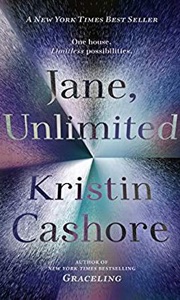Jane Unlimited
by Kristen Cashore
Jane is invited by her former tutor, in town for a college reunion, to visit the family house for a holiday gala. Depressed by the recent death of the aunt who raised her, Jane takes her up on the offer and they arrive at the old family mansion, somewhere off the coast of Maine, where everything is always in an uproar. Jane doesn’t know where to look or what to believe.
Like Cashore’s Bitterblue, this book is filled with strangeness and a coyly theoretical sophistication. Cashore’s characters, whatever their stated ages, seem very young: they are impulsive enthusiasts who have no patience and who seldom know themselves. Jane is an accomplished and original artist, yet somehow has never had occasion to give much thought to her own sexuality or to anyone else’s feelings. This lends many scenes a mythic quality, a sense of meeting archetypes, that frequently works very nicely; elsewhere, as when we sit down for a nice chat at dinner, it feels like nobody knows how to behave.
The first encounter with the old family mansion is handled very well. (It’s described as being off the coast of Maine, but this place is more San Simeon or I Tatti than the old summer cottages of the richly rusticating gilded age.) You’ll like the dog, too.
The book had a long genesis, was originally written in second person, and is filled with complex story play. If Bitterblue sometimes seemed a refraction of Beckett through modern medievalesque fantasy, Jane Unlimited feels like David Mitchell or Jennifer Egan performed in the key of Neil Gaiman.
